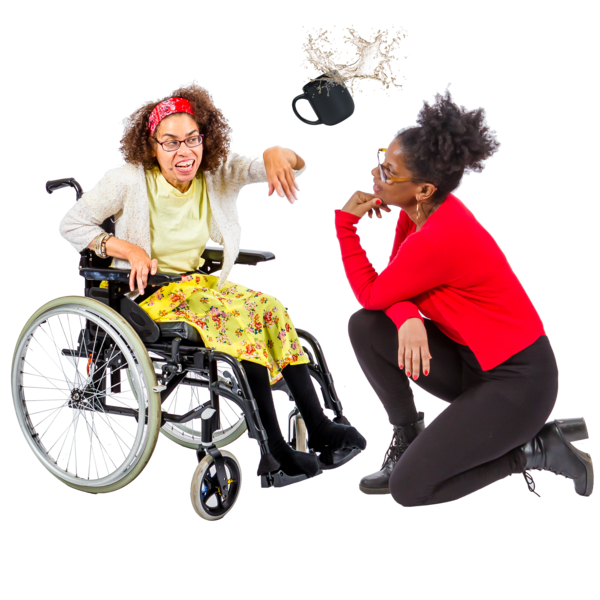In a joint response to the "No voice unheard, no right ignored" paper Mencap and the
Challenging Behaviour
 Challenging behaviour can be when someone hurts themselves, hits or pinches someone else, or breaks something. Some people might behave like this because they are upset or because people do not understand them.
Foundation raised concerns that these changes could take years and offered little immediate help to families whose loved ones are still stuck in
assessment
Challenging behaviour can be when someone hurts themselves, hits or pinches someone else, or breaks something. Some people might behave like this because they are upset or because people do not understand them.
Foundation raised concerns that these changes could take years and offered little immediate help to families whose loved ones are still stuck in
assessment
 An assessment is a way of finding out what help a person needs. When you have an assessment, you might have to go to a meeting or fill in a form.
and treatment units.
An assessment is a way of finding out what help a person needs. When you have an assessment, you might have to go to a meeting or fill in a form.
and treatment units.
Jan Tregelles, chief executive of Mencap, and Viv Cooper, Chief Executive at the Challenging Behaviour Foundation, said:
We welcome the government
The Government are the people who run the country. The Government decide how much tax people should pay and how things like the National Health Service (NHS) should work. ’s recognition that a serious imbalance of power exists within the system, leading to the voices of individuals and their families often being ignored, with devastating consequences. We welcome the government’s commitment to address serious legal issues, such as whether autism
Autism is a disability. Autistic people find it difficult to understand what other people think and feel. They also find it difficult to tell people what they think and feel. Everyone with autism is different. and learning disability
A learning disability is to do with the way someone's brain works. It makes it harder for someone to learn, understand or do things. should constitute grounds for section, when neither are a mental illness. It is also welcome that the consultation
Consultation is finding out what people think about something. seeks to clarify and strengthen the legal rights
Rights are the things everyone should be allowed to do like have a say, or go to school. of people with a learning disability to challenge admissions and be supported to live independently in their local community
A community is the people and places in an area. .
However, whilst this consultation is important, where changes in the law
Laws are the rules that everyone in the country has to follow. If you don't follow the rules you can get in trouble with the police. are needed to deliver new rights, this could take years and is not guaranteed.
And we must remember that on their own, laws are only part of the solution, of making change happen. To ensure that the thousands of people with a learning disability and behaviour that challenges who remain trapped in the system of out-dated institutional care like Winterbourne View can return to their communities we must see – alongside the green paper – the development of local support and services and delivery of the closure programme promised by Simon Stevens when he gave evidence to the Public Accounts Select Committee.
-ENDS-
For further information or to arrange interviews, please contact the Mencap press office on 020 7696 5414 or media@mencap.org.uk.
Notes to editors
About Mencap
There are 1.4 million people with a learning disability in the UK. Mencap works to support people with a learning disability, their families and carers by fighting to change laws, improve services and access to
education
 Education is when you learn things. When you fill in a form to get a job, education means you write where you went to school, college or university.
,
employment
Education is when you learn things. When you fill in a form to get a job, education means you write where you went to school, college or university.
,
employment
 Employment means having a job.
and
leisure
Employment means having a job.
and
leisure
 Leisure is when you have time to do things you enjoy like playing sports or going to the pub.
facilities. Mencap supports thousands of people with a learning disability to live their lives the way they want.
Leisure is when you have time to do things you enjoy like playing sports or going to the pub.
facilities. Mencap supports thousands of people with a learning disability to live their lives the way they want.
Visit www.mencap.org.uk.
For advice and information about learning disability and Mencap services in your area, contact Mencap Direct on 0808 808 1111 (9am-5pm, Monday-Friday) or email help@mencap.org.uk
What is a learning disability?
A learning disability is a reduced intellectual ability which can cause problems with everyday tasks – for example shopping and cooking, or travelling to new places – which affects someone for their whole life.
People with a learning disability can take longer to learn new things and may need support to develop new skills, understand difficult information and engage with other people. The level of support someone needs is different with every individual. For example, someone with a severe learning disability might need much more support with daily tasks than someone with a mild learning disability.
Learning disability is not a mental illness or a learning difficulty. Very often the term ‘learning difficulty’ is wrongly used interchangeably with ‘learning disability’.